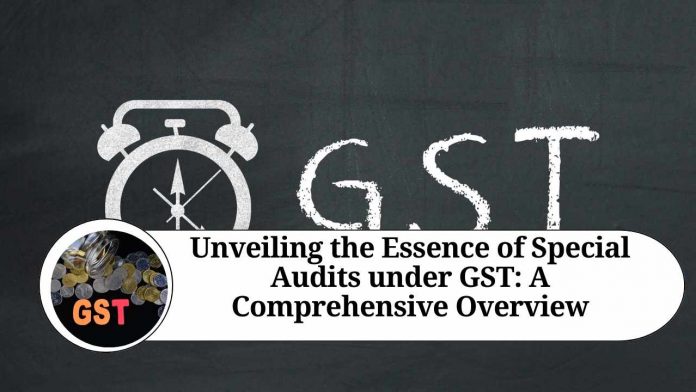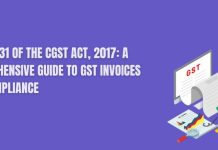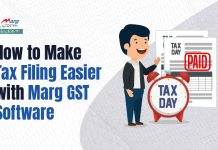In the realm of taxation, transparency, and accountability are essential pillars for maintaining a fair and efficient system. The Goods and Services Tax (GST), introduced in India in 2017, aimed to streamline the taxation process by amalgamating various indirect taxes. To ensure compliance and deter tax evasion, the concept of special audits under GST was introduced. In this blog, we will delve into the intricacies of special audits and explore their significance in promoting a robust GST framework.
Understanding Special Audits under GST:
A special audit is an in-depth examination of a taxpayer’s financial records and GST compliance, conducted by a qualified Chartered Accountant or Cost Accountant appointed by the tax authorities. It serves as a tool to verify the accuracy and validity of the taxpayer’s reported information and assess whether they are adhering to the provisions of the GST law.
Instances Triggering Special Audits:
- The complexity of Transactions: Special audits may be initiated when a taxpayer engages in intricate transactions, such as cross-border supplies, export-oriented activities, or claiming substantial input tax credits. These scenarios require a meticulous examination to ensure compliance and deter fraudulent practices.
- Discrepancies and Inconsistencies: If the tax authorities observe significant discrepancies or inconsistencies in a taxpayer’s GST returns, such as high refund claims or variations in reported sales and purchases, they may opt for a special audit to ascertain the accuracy of the reported data.
- Risk-Based Approach: Tax authorities may employ a risk-based approach to identify taxpayers with a higher probability of non-compliance. This approach involves using data analytics, intelligence reports, and industry-specific risk parameters to target audits effectively.
Salient Features and Provisions:
- Appointment of Auditor: The tax authorities appoint a qualified auditor to conduct the special audit. The auditor assesses the taxpayer’s records, accounts, and other relevant documents to evaluate compliance, tax liability, and the correctness of input tax credit claims.
- Powers and Rights of the Auditor: The auditor possesses powers akin to those of a tax officer, such as summoning and examining individuals, demanding documents and evidence, and conducting on-site inspections. They can also seek assistance from experts or professionals if required.
- Audit Report: Once the audit is completed, the appointed auditor prepares a comprehensive audit report highlighting the findings, observations, and recommendations. This report plays a crucial role in determining the further course of action by the tax authorities.
Implications and Significance:
- Enhanced Compliance: Special audits act as a deterrent to non-compliance, as taxpayers are aware that their records may undergo rigorous scrutiny. This fosters a culture of compliance and discourages fraudulent practices.
- Identification of Loopholes: Special audits help in identifying gaps or weaknesses in the taxpayer’s record-keeping, accounting systems, and internal controls. By addressing these deficiencies, businesses can enhance their efficiency and minimize the risk of errors or irregularities.
- Fairness and Transparency: Special audits reinforce the principles of fairness and transparency in the GST regime. They ensure that all taxpayers are subjected to a similar level of scrutiny, reducing the chances of discrimination or bias.
- Timely Recovery and Refunds: By conducting special audits, the tax authorities can expedite the recovery of outstanding taxes and refunds. The audit findings enable them to take appropriate actions promptly, thereby minimizing revenue leakages.
Conclusion
Special audits under GST serve as a powerful tool in the hands of tax authorities to ensure compliance, deter tax evasion, and maintain the integrity of the GST system. By identifying non-compliant taxpayers and plugging potential loopholes, special audits contribute to a fair, transparent, and efficient taxation framework.
Other Related Blogs: Section 144B Income Tax Act
Frequently Ask Question
Q: What is a special audit under GST?
A: A special audit under GST is an in-depth examination of a taxpayer’s financial records and GST compliance conducted by an appointed auditor to verify the accuracy of reported information and assess compliance with GST provisions.
Q: Who appoints the auditor for a special audit under GST?
A: The tax authorities appoint a qualified Chartered Accountant or Cost Accountant as the auditor to conduct the special audit.
Q: What triggers a special audit under GST?
A: Special audits may be triggered by factors such as complex transactions, significant discrepancies or inconsistencies in GST returns, and a risk-based approach by the tax authorities.
Q: What powers does the auditor possess during a special audit?
A: The auditor possesses powers similar to those of a tax officer, including summoning and examining individuals, demanding documents and evidence, conducting on-site inspections, and seeking assistance from experts or professionals.
Q: What is the role of the auditor in a special audit?
A: The auditor assesses the taxpayer’s records, accounts, and relevant documents to evaluate compliance, tax liability, and the correctness of input tax credit claims. They prepare a comprehensive audit report with findings, observations, and recommendations.
Q: What are the implications of a special audit under GST?
A: Special audits promote enhanced compliance, identify loopholes or weaknesses in record-keeping and internal controls, ensure fairness and transparency, and expedite the recovery of outstanding taxes and refunds.
Q: How does a special audit benefit taxpayers?
A: Special audits provide an opportunity for taxpayers to rectify any non-compliance, improve their record-keeping and internal controls, and maintain transparency, thereby reducing the risk of penalties or further scrutiny.
Q: Can a taxpayer challenge the findings of a special audit?
A: Yes, a taxpayer can challenge the findings of a special audit if they have valid grounds to dispute the conclusions or recommendations made by the auditor. They can present their arguments and evidence to the tax authorities for reconsideration.
Q: Are special audits random or targeted?
A: Special audits can be both random and targeted. While random audits are conducted to maintain overall compliance, targeted audits focus on specific taxpayers based on complex transactions, discrepancies, or a risk-based approach.
Q: Is a special audit a routine process for all taxpayers?
A: No, a special audit is not a routine process for all taxpayers. It is conducted selectively based on triggers mentioned earlier or when the tax authorities deem it necessary to ensure compliance and deter tax evasion.




















